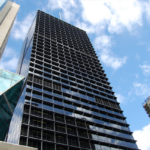How Australia’s office market differs from the U.S. and its resilience
- Australia’s office market differs from the U.S. due to population concentration and bank lending practices
- U.S. commercial real estate has been slow to decline due to long-term leases and loan extensions
- Concerns about the U.S. real estate sector have affected Australian stocks with exposure to the office market
- Dexus’s shares have rallied despite a decline in the value of its office portfolio
- Australian workers have returned to offices more strongly than in the U.S.
- Dexus’s offices continue to attract tenants with high occupancy rates
- The low point in the cap-rate cycle for Dexus’s office portfolio is approaching
Australia’s office market differs from the U.S. due to population concentration and bank lending practices. While the U.S. commercial real estate has been slow to decline, Australia’s market has shown resilience. Concerns about the U.S. real estate sector have affected Australian stocks with exposure to the office market, but Dexus’s shares have rallied despite a decline in the value of its office portfolio. Australian workers have returned to offices more strongly than in the U.S., and Dexus’s offices continue to attract tenants with high occupancy rates. The low point in the cap-rate cycle for Dexus’s office portfolio is approaching as interest rates stabilize and buyer confidence increases.
Public Companies: Dexus (N/A), New York Community Bancorp (N/A), Aozora Bank (N/A)
Private Companies:
Key People: Darren Steinberg (Chief Executive of Dexus), Warwick Negus (Chairman of Dexus)
Factuality Level: 7
Justification: The article provides information from Darren Steinberg, the CEO of Dexus, Australia’s largest office landlord, about the differences between the commercial property markets in the US and Australia. It discusses factors such as population concentration, lending practices, and office occupancy rates. The article also mentions recent troubles in the US commercial property market and the impact on Australian investors. Overall, the article provides factual information and quotes from a credible source, but it lacks in-depth analysis and may benefit from additional data and perspectives.
Noise Level: 7
Justification: The article provides some analysis of the differences between the U.S. and Australian commercial property markets, such as population concentration and lending practices. It also mentions the potential risks in the U.S. market and the performance of Dexus in Australia. However, the article lacks scientific rigor and intellectual honesty as it relies mostly on quotes from Darren Steinberg, the CEO of Dexus, without providing additional evidence or data to support the claims. It also does not provide actionable insights or solutions for the reader.
Financial Relevance: Yes
Financial Markets Impacted: The article discusses the differences between the U.S. and Australian commercial property markets, particularly in terms of lending practices and the concentration of population in major cities. It mentions the impact on the share prices of banks in three different continents due to the U.S. commercial property downturn. However, it does not provide specific information on financial markets or companies impacted.
Presence of Extreme Event: No
Nature of Extreme Event: No
Impact Rating of the Extreme Event: No
Justification: The article does not describe any extreme events.
 www.marketwatch.com
www.marketwatch.com 




